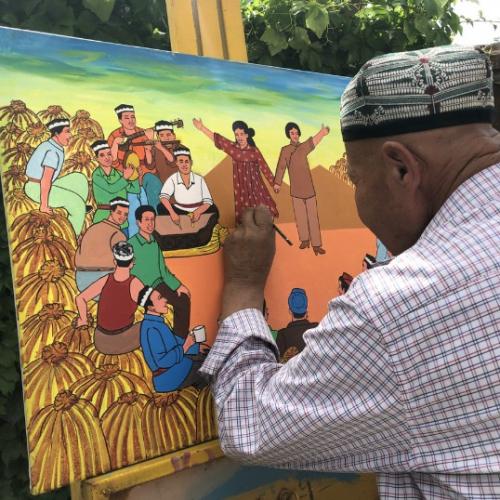



The founding of the People's Republic of China and its socialist system in 1949 laid the political and systemic foundation for the protection of human rights of all ethnic groups in the Xinjiang Uygur autonomous region. And the regional autonomy for ethnic minorities introduced in 1955 has helped further safeguard the rights of all ethnic groups in Xinjiang.
Irrespective of their population size, level of development and religious belief, all ethnic groups have been enjoying human rights, and the same political, economic, social and cultural rights as their Han counterparts thanks to various policies and measures introduced by the central government. This in turn has helped restore stability and promoted socioeconomic development in Xinjiang.
But the rise of terrorism and extremism in Xinjiang resulted in thousands of terrorism-related crimes from 1990 to 2016, which have seriously infringed upon human rights including the right to life, health and development of all ethnic groups, caused the loss of many lives and properties, and hampered the socioeconomic progress of the region.
A part of the global cause of promoting human rights
The World Conference on Human Rights in Vienna in 1993 reaffirmed that protection and promotion of human rights and fundamental freedoms is the first responsibility of a government and the duty of the State, regardless of their political, economic and cultural systems. It also stressed that the national and regional particularities, as well as various historical, cultural and religious backgrounds must be borne in mind during the process.
The European Court of Human Rights, too, has underscored that the State shoulders the first responsibility of promoting human rights while emphasizing the host country has more say than any other country in the assessment of the measures adopted, especially the ones involving national security and crime prevention. Therefore, under the premise of complying with the basic standards of human rights, the State has the discretionary power.
Specifically speaking, by underlining the principle of "protecting the legal, preventing the illegal, curbing extremism, resisting penetration and fighting crimes", the regional government in Xinjiang has adopted a series of measures to fight crimes, prevent crimes at source, empower people through education and safeguard people's rights. Which have served the purpose of protecting and promoting human rights in accordance with international requirements and practices.
Protecting human rights through the rule of law
The central government has implemented the basic principle of promoting human rights through the rule of law, and introduced a series of laws and rules to regulate the protection of human rights and combat the three evil forces of separatism, extremism and terrorism in Xinjiang.
These laws and regulations include the Counter-Terrorism Law of the People's Republic of China, and Regulations of Xinjiang Uygur Autonomous Region on Religious Affairs, and Opinions on Certain Issues Concerning the Application of Law in Handling Criminal Cases Involving Terrorism and Extremism. And all these measures have been taken according to law.
As an important measure to prevent terrorism and fight extremism, the government has established vocational training centers, which help individuals and minor offenders influenced by extremism to gain necessary occupational skills and earn their living respectfully. Thus these people's rights to development and fundamental freedoms have been well ensured, especially because the trainees are often poorly educated, seriously lack awareness of the law and are not proficient in standard Chinese.
To maximize the effects of the training program and prevent the spread of extremism and terrorism, it is necessary to house the trainees together for intensive education and training in boarding centers.
Training centers are both innovative and necessary
Thanks to the training, the trainees have started to know their rights and duties, gaining knowledge about how to exercise them according to law, and improving their proficiency in standard Chinese and learning one or two occupational skills.
Most important, thanks to the program, the trainees have been able to shake off the influence of terrorism and extremism through a comprehensive understanding of the destruction and mayhem terrorism and extremism cause to society.
The training centers are built and operated according to law, and the trainees' personal dignity, basic rights and freedom are fully respected and protected. For instance, trainees can go home regularly and ask for leave anytime, although they have to stay at one of the boarding centers, which all have a canteen, cultural and sports venues, instructors and doctors to ensure the trainees live a normal life. Also, the customs and habits of members of all ethnic groups are respected.
To root out extremism and terrorism, and protect and promote human rights and freedom of all ethnic groups in Xinjiang, the central government has explored and adopted effective measures to combine anti-extremism efforts with empowerment of the trainees through vocational training centers. Modern technologies including big data have also been used in Xinjiang to prevent and fight crimes.
As a result, no violent terrorist incident has been reported from the region in the past two years and the number of other cases including public security cases has also plummeted.
Besides, more than 150 million tourist trips have been made to Xinjiang-a growth rate of 40 percent in 2018 and about 53 percent in the first five months of this year. All this testifies to the effectiveness of the government's measures. In other words, the measures taken in Xinjiang to protect and promote human rights, and fight terrorism and extremism have helped propel the global cause of human rights.
The author is a researcher at the Research Center of Human Rights, Fudan University. The views don't necessarily represent those of China Daily.
If you have any problems with this article, please contact us at app@chinadaily.com.cn and we'll immediately get back to you.